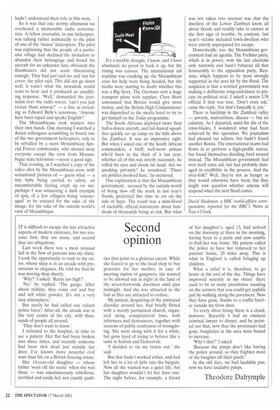CRYING WOLF IN AFRICA
David Shukman reveals an awkward fact
about the great Mozambique flood: most of the 'victims' don't want to be saved
Beira, Mozambique ONE benefit of chartering a helicopter — the only way to view the steamy floodplain of the Zambezi — is that your pilot can tune to particular radio frequencies to listen in to what other helicopters are up to; not just those engaged in the relief effort, but also those hired by rival news organisations. It isn't exactly dignified, and no one likes admitting to it, but on this occasion I heard something horribly revealing about the way the 'international community' (including us in the media) responds to disasters.
We were flying over the endless fields of water, little waves lapping at the straw roofs of the mud huts, the odd wooden canoe picking its way through the remains of the maize crops. The sight of this legendary African river bursting its banks was both spectacular and chilling. And, according to the government of Mozambique, thousands of people have been displaced, and some 40 have died; though quite how they work this out isn't clear, given the vast reach of the flood and the scattered population. We came across plenty of stranded communities, short of food but clinging on. 'Do you want to be rescued?' we would ask. 'Well, actually, no,' said men such as Philip Luis Manhozo, administrator of the village of Gopane. 'We want to stay with our animals. We just want someone to bring us some food and medicine.' This was typical — a practical rather than stoical response from people whose lives are geared to the rise and fall of the Zambezi. If there's the smallest patch of dry land, they'll stick to it; thousands were doing this.
Yet this was not the reaction that was expected — one might say, expected of these people. Mozambican officials kept talking up the massive rescue effort that was needed, insisting on the absolute requirement for foreign helicopters to airlift tens of thousands to safety. It was a compelling line because, let's face it, for all of us — in the media, in aid agencies and, above all, in the Mozambican government — it held out the alluring prospect of finding another baby in a tree.
Remember the impact last year of the birth of Rosita on a high branch above the raging Limpopo? The pictures guaranteed the crisis top billing around the world. They fuelled a huge aid effort, with agencies and governments tumbling over each other to help. And — not undeservedly — Mozambique landed for itself the catch of some $400 million in international donations for reconstruction. That image of a brave South African winchman, dangling beneath his helicopter clutching Rosita and her post-partum mother, was what everyone was after again.
Hence the eavesdropping. The UN's World Food Programme was operating two helicopters, both funded by the British government (as officials kept reminding us), and the Mozambicans had two more (their only two). Every day these aircraft were deployed to search for flood victims. Every day we followed them, headsets pressed to our ears. And every day it was with some embarrassment that officials reported that this rapidly expanding air armada had found, for example, another, er, eight people to shift to safety, or was it .. . cough . . 12? In one settlement of 50 souls, only nine wanted to go. Clearly the flood victims hadn't understood their role in this story.
So it was that one stormy afternoon we overheard a memorable radio conversation. A fellow journalist, in one helicopter, was talking rather animatedly to the pilot of one of the 'rescue' helicopters. The pilot was explaining that the people of a particular village had declined his invitation to abandon their belongings and board his aircraft for an unknown fate; obviously the floodwaters did not seem threatening enough. They had just said no and run for cover, the pilot said. This did not go down well; it wasn't what the newsdesk would want to hear and it produced an unedifying response. 'Well,' demanded the journalist over the radio waves, 'can't you just rescue them anyway?' — a line as revealing as Edward Behr's notorious, 'Anyone here been raped and speaks English?'
The Mozambicans took matters into their own hands. One morning I watched a dozen colleagues scrambling to board one of the two government helicopters, only to be rebuffed by a stern Mozambican Special Forces commander, who shooed away everyone except the crew from Mozambique state television —never a good sign.
That evening, as I watched a copy of the video shot by the Mozambican crew, with sensational pictures of — guess what — a tiny baby being carried to safety, an uncomfortable feeling crept up on me: perhaps I was witnessing a dark example of spin, of a few villagers being 'encouraged' to be rescued for the sake of the image, for the sake of the outside world's view of Mozambique.
It's a terrible thought, I know, and I have absolutely no proof to back it up, but the timing was curious. The international aid machine was cranking up, the Mozambican cries for help were being heeded, but the media were starting to doubt whether this was a Big Story. The Germans sent a huge transport plane with supplies. Clare Short announced that Britain would give more money, and the British High Commissioner was dispatched to the media hotel to try to get himself on the Today programme.
The South Africans deployed more than half-a-dozen aircraft, and fair-haired squaddies quickly set up camp on the hills above the Zambezi. It was an impressive sight. But when I asked one of the South African commanders, a bluff, well-worn airman who'd been in the thick of it last year, whether all of this was strictly necessary, he rolled his eyes and shook his head. Are we speaking privately? he wondered. 'There are politics involved here,' he muttered.
One explanation is that the Mozambican government, accused by the outside world of being slow off the mark in last year's floods, preferred this time to err on the side of hype. The result was a mini-flood of excitable official statements about hundreds of thousands being at risk. But what was not taken into account was that the dwellers of the Lower Zambezi know all about floods and readily take to canoes at the first sign of trouble; by contrast, last year's victims included town-dwellers who were utterly unprepared for escape.
Domestically, too, the Mozambican government had an agenda. The Frelimo party, which is in power, won the last elections only narrowly and hasn't behaved all that honourably to the opposition party, Renamo, which happens to be most strongly supported in the area hit by the flood. The suspicion is that a worried government was making a deliberate song-and-dance to placate its political rival. I asked a senior UN official if that was true. 'Don't even ask,' came the reply, tut that's basically it, yes.'
There is hardship in the Zambezi valley — poverty, malnutrition, disease — but no calamity. As I departed, amid the din of the rotor-blades, I wondered what had been achieved by this operation. We journalists had pleased our editors, but hadn't found another Rosita. The international teams had flown in to perform a high-profile rescue, but found themselves shuttling food around instead. The Mozambican government had won itself extra aid, but had probably damaged its credibility in the process. And the river-folk? Well, they're not as hungry as they would otherwise have been; but they might now question whether anyone will respond when the next flood comes.
David Shukrnan, a BBC world-affairs correspondent, reported for the BBC's News at Ten o'Clock.



































































 Previous page
Previous page